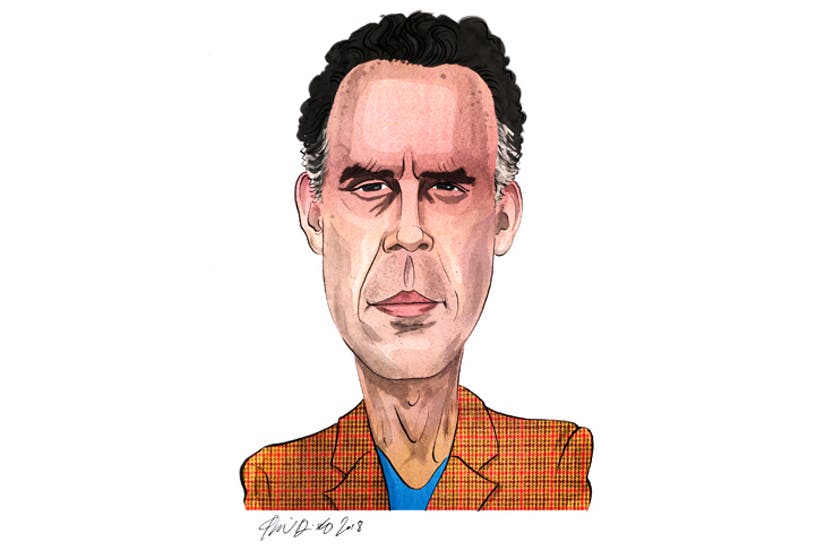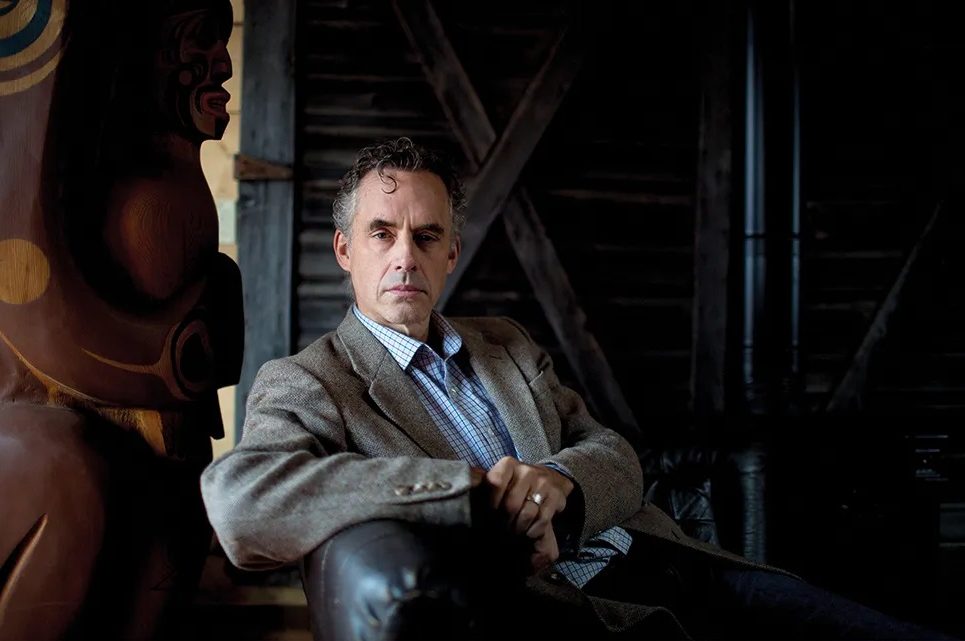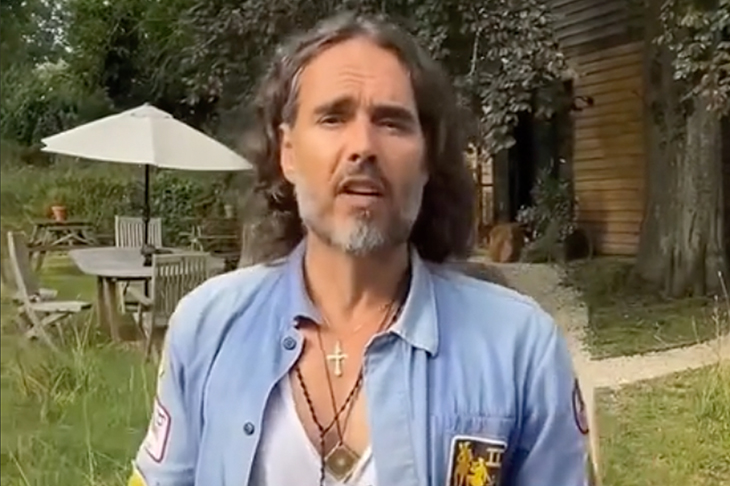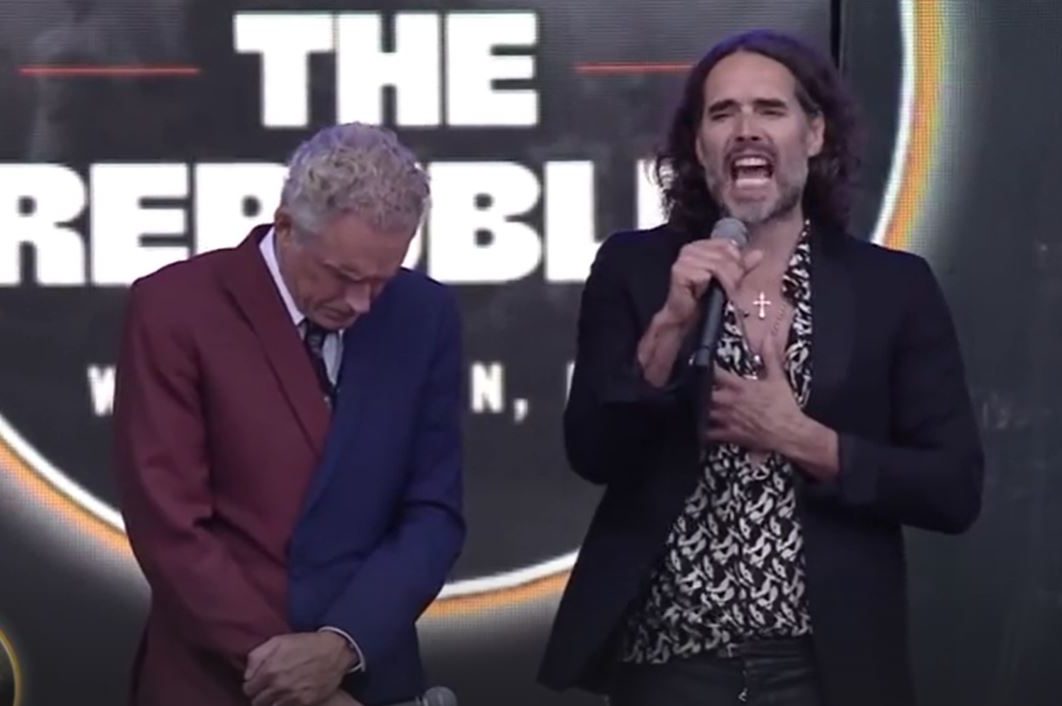‘I’m hoping the Democrats get walloped.’ Doctor Jordan B Peterson is in a rambunctious mood as he prepares to address a packed Cambridge Union. He is of course referring to the midterm elections and he appears especially troubled by the Democrats’ determination to appeal to what he describes as a ‘tiny radical faction of the voter base’. ‘I don’t think they’re going to wake up until they get defeated,’ he tells me, furrowing that famous brow. A preferable outcome for America, he thinks, would be if a set of moderate Democrats was elected but in such aggressively partisan times, this seems an unlikely scenario.
Backstage at the Union the individualist’s individualist is readying himself for a possible avalanche of groupthink snowflakery. Although pumped and ready for action, I sense an edge of weary incredulity as we discuss the parlous state of US politics. The Democrats’ failure to convince Trump supporters of their hero’s feckless bigotry has, he believes, deepened already entrenched opinions. With trust in political leaders at an all time low, the author of 12 Rules for Life thinks the two parties should take a leaf out of his bestselling book and get their own houses in order before hurling insults at each other. He worries that a flailing liberal elite, hungry for impeachment, has been unfairly targeting the president. ‘It’s ridiculous to label Trump as far-right; he’s certainly an anomaly. As a personality, he’s more of a libertarian. He’s not a traditional Republican and he’s certainly not a traditional rightwing figure apart from the fact that he has this large populist base.’
Trying to pin the recent Pittsburgh anti-Semitic atrocity on the president is, Peterson tells me, another low in an increasingly corrupt political arena. Conflating Trump rhetoric with mass homicide is ‘unhelpful’ and ‘absurd’. ‘We should leave the racist label to people who deserve it,’ he warns, ‘otherwise we debase the currency. Once everyone’s a racist, well that’s the end of that as a useful epithet.’
Peterson is struggling to comprehend why Trump has become such a hate figure. He attributes some of the vitriol to what he calls the president’s nouveau riche credentials, which seem to ‘rub upper-class educated people up the wrong way’. ‘The one thing the intellectual elite will never understand is that if you are poor you can become rich, but if you are not part of the establishment elite, you will never become part of it.’ The president then, for all his coarse bombast, is at least able to reflect the aspirant tendencies of ordinary Americans, even if he was born into money.
As for the deepening culture war, Peterson hasn’t gone as far as journalist Carl Bernstein who recently described the toxic political and cultural climate as like a ‘cold civil war’. However he is concerned about the demonization of Middle-American values, which he believes is fueling a dangerous kind of class war. Quoting from a recent report into America’s Polarized Landscape by the More in Common organization, he acknowledges a definite split between the 8 percent minority of ‘progressive activists’, the ‘devoted conservative’ 6 percent at the opposite extreme and an ‘exhausted majority’ who occupy the centre ground and feel left out of the national conversation. Despite all the polarizing and the posturing, there does appear to be one unifying force binding America; according to the report, 80 percent of the population believe ‘political correctness is a problem in our country.’ More surprisingly, 74 percent of 24 to 29-year olds and 79 percent of those under 24 have grown weary of wokeness. Having to tread on eggshells every time they want to express an opinion has made political correctness seem ‘scary’ to many young people. Ironically, white Americans are less concerned about political correctness (79 percent) than Asians (82 percent), Hispanics (87 percent), and Native Americans (88 percent) while three-quarters of African Americans say they oppose PC culture.
But it is the racially homogenous, highly educated, $100k-a-year-earning 8 percent that bothers Peterson. ‘There’s this little group of privileged people who think they know what’s good for the dispossessed minorities who don’t even want the cure themselves.’ He finds what he calls the ‘neo-colonialism of the radical left’ laughable and ironic but fears their hectoring authoritarianism will only grow shriller as civil discourse deteriorates. He cites the recent ‘resignation’ of New York Review of Books editor Ian Buruma as an example of how bullying social warrior types are setting the cultural agenda.
Buruma initially stood by his decision to publish a contentious account of Canadian DJ Jian Ghomeshi’s fall from grace after being accused and then acquitted of multiple cases of sexual harassment. He claimed that the #MeToo movement had been full of ‘undesirable consequences’, implying innocent men were being falsely accused. His intention remained ‘to help people think this sort of thing through.’ But the barrage of online abuse that followed publication quickly dissolved any chance of a reprieve and Buruma stepped down after claiming to have been ‘convicted on Twitter, without any due process.’
‘I read the Ghomeshi essay…’ Peterson recalls with barely disguised fury, ‘and it was a perfectly reasonable thing to publish. It’s a topical matter and reading what Ghomeshi has to say after a year of contemplation and exile from the mainstream has broad general interest. The idea that the decision was a fireable offense on the part of the editor is absolutely preposterous. And for those interested in the intellectual life to be applauding when someone is persecuted for merely being associated with a controversial essay is equally appalling. It’s not even as though the Ghomeshi essay was that flattering to Ghomeshi.’
By playing into the hands of what he describes as the ‘carnivorous radical ideologues’, Peterson believes we are setting a dangerous precedent that is only going to get worse. He is of course only too familiar with what happens to public figures who dare to explore ideas outside the liberal consensus. The eroding of free speech still makes him spit with rage.
In the wake of #MeToo, the question of whether men accused of sexual misconduct should be allowed to rehabilitate themselves remains a divisive issue, but every time an essay is banned or a person loses their job for holding unpalatable views, the noose tightens and we risk ever more draconian admonishments. Donald ‘grab ’em by the pussy’ Trump is often associated with toxic, heterosexual masculinity but I wonder whether the public is growing immune to the president’s personal shortcomings. For Peterson, it all comes down to priorities and a willingness to acknowledge when things are going well.
‘Wages are rising, unemployment is down to levels not seen since the early Sixties and the economy is growing at a phenomenal rate. Trump is noisy and bombastic and he has a narcissistic edge but he certainly hasn’t turned out to be the absolute disaster that his enemies predicted. He’s even making headway in North Korea.’
The hallmark of a good presidency as far as Peterson is concerned is an ability to keep the peace and the fact that Trump has so far kept America out of ‘stupid destructive wars’ is, he thinks, a start. For now, he is reserving judgement but his political philosophy remains in keeping with the founders of the American Constitution who believed that ‘if we could not have a disaster continually, then that would be a good thing.’
No such disasters befall the doctor as he tackles some thoughtful questioning from an enthusiastic Cambridge Union crowd. Apart from a rather forlorn student handing out anti-Peterson leaflets at the door (the doctor apparently endorses fascist conspiracy theories), there isn’t a single, shrieking no-platformer in sight, which must be a welcome respite from the usual hostile reception he receives at most Ivy League institutions. And judging by the Cambridge students’ smart attire and good posture (rule one of Peterson’s 12) this particular ‘elite minority’ seem largely in favor of the doctor’s homely advice. When a gauche gender studies major timorously suggests that Peterson is a peddler of pseudo science, the comeback is swift and typically waspish, ‘being criticized by gender studies types,’ he quips, ‘is like being nibbled to death by ducks.’
At the Union bar after the event, I overhear a couple of well-groomed political science majors discussing the possibility of Peterson running for president, ‘of the Union?’ I ask, ‘No…America of course!’
The War on Masculinity by James Innes-Smith will be published by Little Brown in September 2019.

























